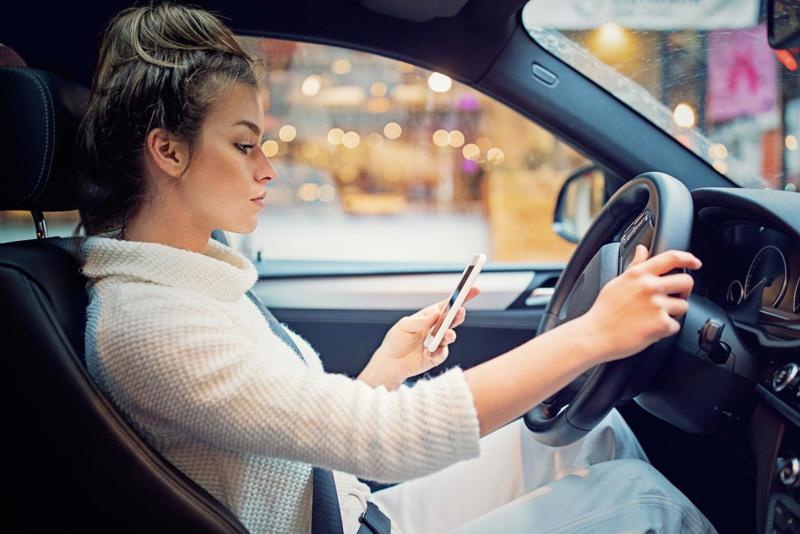This feature was taken from our special Running a Safe Fleet report.

While mobile phones have become an indispensable part of modern life, their use has also become a scourge for fleet decision-makers.
Evidence shows that drivers using them – whether holding or using the device hands-free – are four times more likely to crash, show poor hazard detection ability and take longer to react to any hazards they notice.
“The human brain isn’t like a computer. We don’t have two parallel streams of attention where we can process one task within one and another in the other,” says Gemma Briggs, professor of applied cognitive psychology at The Open University.
“It’s not how it works. What we do is shift between two tasks and there's a momentary lag called a resumption lag, when we shift back to the first task.
“The problem is your brains are so amazing that they fill in the gaps so your conscious awareness is that everything’s fine, everything’s smooth, nothing bad has happened, but you don’t know.
“The only time that you’ll become aware is if something unexpected happens such as you crash.”
Briggs says this leads to a condition known as inattentional blindness, which is when drivers cannot see hazards directly in front of them even when they are looking straight at them.
“In some of our laboratory studies we’ve presented a hazard directly where someone is looking – and we know they are looking at it because we’ve got an eye tracker on them – but they fail to see it,” she adds.
This cognitive distraction is the key issue with mobile phone use, says Briggs.
When people are having a conversation, they naturally picture where people are, what they’re describing and what they’re up to.
Conference calls can be even more problematic because a driver may have multiple people talking to them and that ramps up the distraction quite considerably.
“The mental resources needed to create those images in your brain are the same mental resources that are needed for accurate visual perception of the driving situation,” says Briggs.
“The effect persists around five minutes after your phone use has ended. It’s not just about physically holding or looking at a phone, this distraction is enduring.”
Phone use law
Under a 2022 law, it is illegal to hold and use a phone, sat-nav, tablet or any device that can send or receive data while driving.
This means you must not use a device in your hand for any reason, whether online or offline, with the law still applying if you’re stopped at traffic lights, queuing in traffic or driving a car that turns off the engine when it stops moving.
Drivers who break this law may get six penalty points and a £200 fine if caught.
If they have passed their driving test in the previous two years, they will lose their licence.
Drivers can also get three penalty points if they do not have a full view of the road and traffic ahead or proper control of the vehicle.
They could also be taken to court where they could be banned from driving and get a maximum fine of £1,000 (£2,500 if they are driving a lorry or bus).
The law, however, does not prohibit the use of hands-free devices provided the driver does not hold them at any time during usage.
This is problematic as hands-free phone use is just as dangerous as using a handheld, says Briggs.
“Because of the law, most people, understandably, may have the attitude that hands-free phone use is the safe, legal and responsible thing to do,” she adds.
“But in terms of the science, it doesn’t make any difference whether it is handheld or hands-free: you are four times more likely to be involved in a collision than if you don’t use your phone.”
Balfour Beatty has banned the use of handheld or hands-free phones, or any associated telecommunications equipment or technology, while a person is driving.
Employees are told to use their answerphone message to inform any caller that they are driving, and they should stop in a safe place to retrieve messages and make phone calls.
“It was key that we got sponsorship from the very top for this policy, and then all the hard work started,” says Adrian Wanford, group compliance manager for Balfour Beatty Group Transport.
“We had to update our commercial vehicle and company car driver policies, and communicated these to everybody through toolbox talks, briefing sessions, alerts, driver handbooks and our e-learning package.
“We also gave guidance on how to manage the ban – things like telling drivers to switch their phone off and put it in the boot.
“They know that if they’ve got to make calls to plan those for pre-arranged stops, where they’re going to have a comfort break and a coffee.”
It is also important for any policy to be strictly – and consistently – enforced.
“Some of the companies I’ve spoken to that have a really effective complete ban on phone use have enforced it at the highest level,” says Briggs.
“They’ve sacked senior members of staff who have flouted the rules. And it seems that that kind of hardline approach, alongside little nudges as to why you should be following policy, is the most effective way.”
Briggs says there should also be a mechanism in place where drivers are able to push back without fear of retribution if their line manager knowingly flouts the rules by calling them about their next job when they know they are on the road.
“It needs to be crystal clear that that’s how things work and there are mechanisms in place to support everyone,” she adds.
You could be forgiven for thinking that all fleet managers are interested in these days is electric vehicles: how to transition, charging, reimbursements and so on. Such discussion dominates opinion pieces, media column inches, social media discussion and even webinars.
Yes, it’s a juicy topic. No, it’s not what most fleet decision-makers are spending all their time thinking about.
This report on running a safe fleet looks at how to create a safety culture and implement a driver behaviour programme, as well as tackle root causes of accidents, in discussion with fleet leaders and industry experts with the sole purpose of helping you to deliver a robust risk and compliance policy, protecting both your staff and your business.























Andrew Bates - 12/04/2024 10:52
Why single-out phones? Smoking, Vaping, mis-behaving Kids in the back seat etc. are ALL more distracting than a hands-free call.